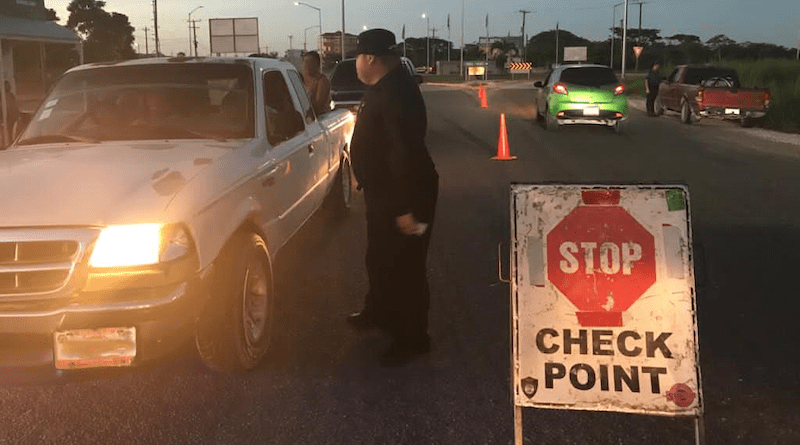More Than 250 Human Traffickers And People Smugglers Behind Bars After Pan American Police Operation
An INTERPOL operation targeting human trafficking and migrant smuggling across Latin America and the Caribbean has seen victims rescued, migrants detected and suspected perpetrators arrested in 32 countries.
The fourth in INTERPOL’s ‘Turquesa’ series of operations, the five-day (28 November – 2 December) operation saw Latin American investigators use INTERPOL capabilities to work with police forces on all continents to generate investigative leads and disrupt the global crime groups behind people trafficking and migrant smuggling.
Frontline officers conducted controls at trafficking and smuggling hotspots identified ahead of operations, with particular emphasis on transit points such as airports, bus terminals and border crossings.
Although results are still coming in, preliminary reporting points to the arrest of 268 individuals suspected of involvement in migrant smuggling, human trafficking, or associated crime such as document fraud and sexual offences.
A total of 9,015 irregular migrants were detected, and 128 women and two men rescued from human trafficking. Most of the trafficked victims were from Colombia and Venezuela.
Global trafficking crossroads
Multiple cases involved the interception in Central America of migrant men, women and children from all parts of the world on their way to North America, including the detection in Mexico of 2,400 migrants from the Americas (Venezuela, Cuba), Africa (Angola, Burkina Faso, Guinea and Ethiopia) and Asia (Bangladesh and Nepal).
Mirroring this global smuggling link, Nicaragua police detected more than 2,000 migrants traveling from Asia (Afghanistan, China, India, Kyrgyzstan, and Nepal), Africa (Angola, Burkina Faso, Cameroon, Ghana, Nigeria and Togo) as well as the Americas (Haiti and Ecuador) towards the US and Canada.
Honduras authorities arrested a 30-year-old woman for the organized sexual exploitation of three minors and Guatemala police arrested a similarly aged woman on suspicion of both human trafficking and migrant smuggling.
El Salvador authorities arrested a number of women suspected of trafficking their own children, including a disabled girl, who were destined for sexual exploitation.
Chilean police controls on the border with Bolivia and Peru saw 300 migrants from Venezuela and Bolivia, including minors, detected whilst Brazilian authorities arrested four suspects attempting to smuggle 21 migrants from Cuba and South Africa between French Guyana and Brazil.
Illustrating the growing trafficking link between Latin America and Europe, Bolivia arrested a Red Notice subject wanted by Spain for sexual abuse, and in Paraguay a woman who was the subject of a Red Notice for human trafficking and sexual exploitation, was arrested attempting to traffic her niece to Spain for sexual exploitation.
“Human trafficking and migrant smuggling are multi-billion euro criminal industries, bankrolling the world’s most dangerous organized crime groups and violating the fundamental rights of victims in the process,” said INTERPOL Secretary General Jürgen Stock.
“The stories we hear of exploitation on global migrant trails in operations like Turquesa IV are heartbreaking, and law enforcement has a duty to safeguard the victims while bringing the perpetrators to justice,” added Secretary General Stock.
Sustainable, long-term impact
To share contemporary investigation and victim interview techniques, strengthen the region’s ability to investigate cases of human trafficking and migrant smuggling, and support cooperation at the regional and international levels, Turquesa IV’s action phase was preceded by training workshops.
INTERPOL’s National Central Bureau in Chile supported participating countries’ operational and investigative needs throughout the week-long operation by hosting a dedicated coordination unit staffed by local and INTERPOL experts on financial crime, human trafficking and migrant smuggling.
A cross-sector, coordinated approach involving CARICOM IMPACS, UNODC, IOM and Europol enabled Operation Turquesa IV to combine collective strengths and exchange best practices for maximum results on the ground whilst also ensuring victims received appropriate care and protection throughout the judicial processes.
Funded by GAC Global Affairs Canada, Operation Turquesa IV is the second operation of its kind to be coordinated with the support of INTERPOL’s ‘PROTEGER’ Project which aims to strengthen law enforcement capacity in Latin America and the Caribbean to stem migrant smuggling, with special attention to gender considerations.

